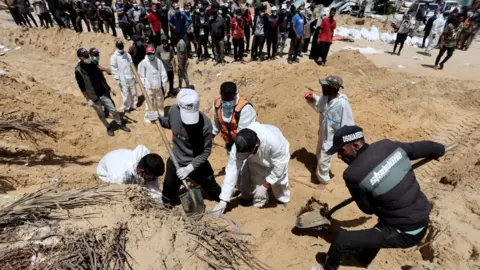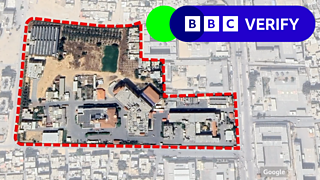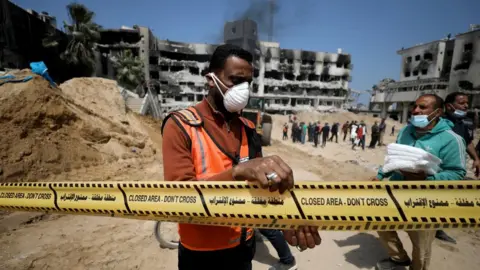
The Israeli military did not offer an immediate comment.
"Our civil defence crews are still recovering bodies from inside Nasser Medical Complex, and since Saturday bodies of nearly 200 martyrs have been retrieved," said Mahmud Bassal, spokesman for Gaza's Civil Defence.
Bassal said several of the recovered bodies had decomposed. "There is difficulty identifying them, but civil defence efforts are ongoing," he said.
Ismail al-Thawabta, head of the Hamas government media office in the Palestinian territory, gave a higher figure of 283 bodies found at the hospital.
"We discovered mass graves inside Nasser Medical Complex" of people killed by "the occupation (Israeli) army", Thawabta told journalists.
Muhammad al-Mughayyir, a senior official at the civil defence agency, also confirmed the discovery of corpses at the facility and said the work to retrieve the remaining bodies would continue until Thursday.
Mass Graves In Gaza Show Victims’ Hands Were Tied, Says UN Rights Office
Disturbing reports continue to emerge about mass graves in Gaza in which Palestinian victims were reportedly found stripped naked with their hands tied, prompting renewed concerns about possible war crimes amid ongoing Israeli airstrikes, the UN human rights office, OHCHR, said on Tuesday.
The development follows the recovery of hundreds of bodies “buried deep in the ground and covered with waste” over the weekend at Nasser Hospital in Khan Younis, central Gaza, and at Al-Shifa Hospital in Gaza City in the north. A total of 283 bodies were recovered at Nasser Hospital, of which 42 were identified.
“Among the deceased were allegedly older people, women and wounded, while others were found tied with their hands…tied and stripped of their clothes,” said Ravina Shamdasani, spokesperson for the UN High Commissioner for Human Rights.
Al-Shifa discovery
Citing the local health authorities in Gaza, Ms. Shamdasani added that more bodies had been found at Al-Shifa Hospital.
The large health complex was the enclave’s main tertiary facility before war erupted on 7 October. It was the focus of an Israeli military incursion to root out Hamas militants allegedly operating inside which ended at the beginning of this month. After two weeks of intense clashes, UN humanitarians assessed the site and confirmed on 5 April that Al-Shifa was “an empty shell”, with most equipment reduced to ashes.
“Reports suggest that there were 30 Palestinian bodies buried in two graves in the courtyard of Al-Shifa Hospital in Gaza City; one in front of the emergency building and the others in front of the dialysis building,” Ms. Shamdasani told journalists in Geneva.
The bodies of 12 Palestinians have now been identified from these locations at Al-Shifa, the OHCHR spokesperson continued, but identification has not yet been possible for the remaining individuals.
“There are reports that the hands of some of these bodies were also tied,” Ms. Shamdasani said, adding that there could be “many more” victims, “despite the claim by the Israeli Defense Forces to have killed 200 Palestinians during the Al-Shifa medical complex operation”.
200 days of horror
Some 200 days since intense Israeli bombardment began in response to Hamas-led terror attacks in southern Israel, UN human rights chief Volker Türk expressed his horror at the destruction of Nasser and Al-Shifa hospitals and the reported discovery of mass graves.
“The intentional killing of civilians, detainees and others who are hors de combat is a war crime,” Mr. Türk said in a call for independent investigations into the deaths.
Mounting toll
As of 22 April, more than 34,000 Palestinians have been killed in Gaza, including 14,685 children and 9,670 women, the High Commissioner’s office said, citing the enclave’s health authorities. Another 77,084 have been injured, and over 7,000 others are assumed to be under the rubble.
“Every 10 minutes a child is killed or wounded. They are protected under the laws of war, and yet they are ones who are disproportionately paying the ultimate price in this war,” said the High Commissioner.
Türk warning
The UN rights chief also reiterated his warning against a full-scale Israeli incursion of Rafah, where an estimated 1.2 million Gazans “have been forcibly cornered”.
“The world’s leaders stand united on the imperative of protecting the civilian population trapped in Rafah,” the High Commissioner said in a statement, which also condemned Israeli strikes against Rafah in recent days that mainly killed women and children.
This included an attack on an apartment building in the Tal Al Sultan area on 19 April which killed nine Palestinians “including six children and two women”, along with a strike on As Shabora Camp in Rafah a day later that reportedly left four dead, including a girl and a pregnant woman.
“The latest images of a premature child taken from the womb of her dying mother, of the adjacent two houses where 15 children and five women were killed, this is beyond warfare,” said Mr. Türk.
The High Commissioner decried the “unspeakable suffering” caused by months of warfare and appealed once again for “the resulting misery and destruction, starvation and disease and the risk of wider conflict” to end.
Mr. Türk also reiterated his call for an immediate ceasefire, the release of all remaining hostages taken from Israel and those held in arbitrary detention and the unfettered flow of humanitarian aid.
Massive settler attacks in West Bank
Turning to the West Bank, the UN rights chief said that grave human rights violations had continued there “unabated”.
This was despite international condemnation of “massive settler attacks” between 12 and 14 April “that had been facilitated by the Israeli Security Forces (ISF)”.
Settler violence has been organized “with the support, protection, and participation of the ISF”, Mr. Türk insisted, before describing a 50-hour long operation into Nur Shams refugee camp and Tulkarem city starting on 18 April.
“The ISF deployed ground troops, bulldozers and drones and sealed the camp. Fourteen Palestinians were killed, three of them children,” the UN rights chief said, noting that 10 ISF members had been injured.
In a statement, Mr. Türk also highlighted reports that several Palestinians had been unlawfully killed in the Nur Shams operation “and that the ISF used unarmed Palestinians to shield their forces from attack and killed others in apparent extrajudicial executions”.
Dozens were reportedly detained and ill-treated while the ISF “inflicted unprecedented and apparently wanton destruction on the camp and its infrastructure”, the High Commissioner said.
UN rights chief 'horrified' by mass grave reports at Gaza hospitals
By David Gritten,

The UN's human rights chief has said he is "horrified" by the destruction of Gaza's Nasser and al-Shifa hospitals and the reports of "mass graves" being found at the sites after Israeli raids.
Volker Türk called for independent investigations into the deaths.
Palestinian officials said they had exhumed the bodies of almost 300 people at Nasser. It is not clear how they died or when they were buried.
Israel's military said claims that it buried bodies there were "baseless".
But it did say that during a two-week operation at the hospital in the city of Khan Younis in February, troops "examined" bodies buried by Palestinians "in places where intelligence indicated the possible presence of hostages".
Ten hostages who have now been released have said that they were held at Nasser hospital for long periods during their captivity.
Prior to the Israeli operation at Nasser, staff there had said they were being forced to bury bodies in the hospital's courtyard because nearby fighting prevented access to cemeteries. There were similar reports from al-Shifa before the first Israeli raid on the hospital took place in November.
The Israeli military has said it has raided a number of hospitals in Gaza during the war because Hamas fighters have been operating inside them - a claim Hamas and medical officials have denied.
The war began when Hamas gunmen carried out an unprecedented cross-border attack on southern Israel on 7 October, killing about 1,200 people - mostly civilians - and taking 253 others back to Gaza as hostages.
More than 34,180 people - most of them children and women - have been killed in Gaza since then, the territory's Hamas-run health ministry says.
Trapped by gunfire at Gaza hospital, people risked death to help injured
A spokeswoman for the UN Human Rights Office said it was currently working on corroborating reports from Palestinian officials that 283 bodies had been found in Nasser hospital's grounds, including 42 which had been identified.
"Victims had reportedly been buried deep in the ground and covered with waste," Ravina Shamdasani told reporters in Geneva.
"Among the deceased were allegedly older people, women and wounded, while others... were found with their hands tied and stripped of their clothes."
Mr Türk called for independent, effective and transparent investigations into the deaths, adding: "Given the prevailing climate of impunity, this should include international investigators."
"Hospitals are entitled to very special protection under international humanitarian law. And the intentional killing of civilians, detainees, and others who are hors de combat [not participating in hostilities] is a war crime."
On Monday, a spokesman for the Hamas-run Civil Defense force told BBC Arabic's Gaza Today programme that it had received reports from local Palestinians that the bodies of a "large number" of people who had been killed during the war and buried in a makeshift cemetery in the hospital's courtyard were moved to another location during the Israeli raid.
"After research and investigation, we learned that the occupation [Israeli] army had established a mass grave, pulled out the bodies that were in Nasser hospital, and buried them in this mass grave," Mahmoud Basal said.
Gaza Today also spoke to a man who said he was searching there for the bodies of two male relatives which he alleged had been taken by Israeli troops during Israel's recently concluded offensive in Khan Younis.
"After I had buried them in an apartment, the [Israelis] came and moved their bodies," he said. "Every day we search for their bodies, but we fail to find them."
Hamas has alleged that the bodies include people "executed in cold blood" by Israeli forces, without providing evidence.

Contains some violence and disturbing scenes.
2:11
Contains some violence and disturbing scenes.BBC Verify authenticates video from key moments in the story of Nasser Medical Complex in Gaza
The Israel Defense Forces (IDF) said in a statement on Tuesday: "The claim that the IDF buried Palestinian bodies is baseless and unfounded."
"During the IDF's operation in the area of Nasser Hospital, in accordance to the effort to locate hostages and missing persons, corpses buried by Palestinians in the area of Nasser hospital were examined.
"The examination was conducted in a careful manner and exclusively in places where intelligence indicated the possible presence of hostages. The examination was carried out respectfully while maintaining the dignity of the deceased. Bodies examined, which did not belong to Israeli hostages, were returned to their place."
The IDF said that its forces had detained "about 200 terrorists who were in the hospital" during the raid, and that they found ammunition as well as unused medicines intended for Israeli hostages.
It also insisted that the raid was carried out "in a targeted manner and without harming the hospital, the patients and the medical staff".
However, three medical staff told the BBC last month that they were humiliated, beaten, doused with cold water, and forced to kneel for hours after being detained during the raid.
Medics who remained at Nasser after the Israeli takeover said they were unable to care for patients and that 13 died because of conditions there, including a lack of water, electricity and other supplies.

On 1 April, Israeli troops withdrew from al-Shifa hospital, which is in Gaza City, following what the IDF said was another "precise" operation carried out in response to intelligence that Hamas had regrouped there.
The IDF said at the time that 200 "terrorists" were killed in and around the hospital during the two-week raid. More than 500 others were detained, and weapons and intelligence were found "throughout the hospital", it added.
After a mission gained access to the facility five days later, the World Health Organization (WHO) said al-Shifa was "now an empty shell", with most of the buildings extensively damaged or destroyed, and the majority of equipment unusable or reduced to ashes.
It also said that "numerous shallow graves" had been dug just outside the emergency department, and the administrative and surgical buildings, and that "many dead bodies were partially buried with their limbs visible".
The IDF also said it had avoided harm to patients at al-Shifa. But the WHO cited the acting hospital director as saying patients were held in abysmal conditions during the siege, and that at least 20 patients reportedly died due to a lack of access to care and limited movement authorised for medics.
Spokeswoman Ms Shamdasani said reports seen by the UN human rights office suggested that a total of 30 bodies were buried in the two graves and that 12 of them had been identified so far.
Gaza's civil defence spokesman told CNN on 9 April that 381 bodies had been recovered from the vicinity of al-Shifa, but that the figure did not include people buried in the hospital's grounds.
The UN human rights chief also deplored as "beyond warfare" a series of Israeli strikes on the southern city of Rafah in the past few days, which he said had killed mostly women and children.
The strikes included one on Saturday night, after which a premature baby was delivered from the womb of her pregnant mother, who was killed along with her husband and other daughter.
Mr Türk also again warned against a full-scale Israeli ground assault on Rafah, where 1.5 million displaced civilians are sheltering, saying it would lead to further breaches of international humanitarian law and human rights law.
In response, the IDF said it was "operating to dismantle Hamas military and administrative capabilities".
"In stark contrast to Hamas' intentional attacks on Israeli men, women and children, the IDF follows international law and takes feasible precautions to mitigate civilian harm," it added.
No comments:
Post a Comment